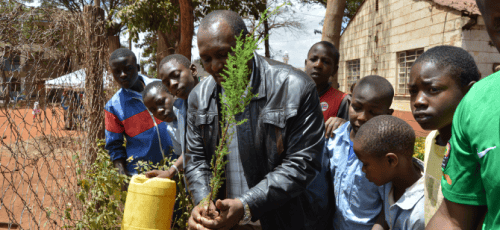News > Blog
Nairobi Schools Continue to Grow from Green Apple Day of Service
Published 04/18/2016 by Global Communities

Nairobi Schools Continue to Grow from Green Apple Day of Service
By Ann Wahinya
Originially published on the US Green Building Council Website
Ann Wahinya is the program coordinator for the Determined, Resilient, Empowered, AIDS-Free, Mentored and Safe (DREAMS) program, which is implemented by Global Communities in the informal settlements of Nairobi. Global Communities is an international development organization working with communities around the world to bring about sustainable changes that improve the lives and livelihoods of the vulnerable.
For the past three years, Global Communities’ Kenya office has supported better learning environments in support of the Global Coalition for the Center for Green Schools’ Green Apple Day of Service (GADOS). GADOS is a global movement promoting sustainable schools that practice, teach and support environmentally responsible choices. In October 2015, Global Communities supported three nonformal primary schools in Majengo, one of the oldest and most marginalized informal settlements in Kenya’s capital of Nairobi. Nearly three months later, the schools continue to harvest the benefits of the event.
The Global Communities team supported Child Survival Primary School, Undugu Basic Education School and St. John’s Community Primary School. In addition to raising money to help with water, sanitation and other infrastructure improvements to create more conducive learning environments, staff from Global Communities also met with teachers and students to identify critical improvements.
Fixing critical needs
Child Survival’s floors were potholed, making seating arrangements difficult, and there was only one functional toilet for its 260 students. The head teacher shared that most girls would miss school during their menstrual cycle, because they had experienced fights and bullying from other students. At Undugu, which has 200 students, the classroom partitions were broken and walls were unpainted, making the rooms loud and dark.
Through Global Communities’ teamwork, Child Survival Primary School now has 12 functional toilets, which has helped improve female students’ confidence and reduce absenteeism. The floors in three lower primary classrooms were also leveled, promoting better seating arrangements and hygiene. One of the class teachers commented, “Since the classroom floors were renovated, the students seem more excited to come to class. We just re-opened school…and were able to clean the classrooms with water, which is a major achievement for us.”
At Undugu Community School, the team painted the classroom walls. The local government administrative unit for Majengo was inspired by the effort and joined in to paint the outer walls, toilets and an additional classroom. In addition, both Undugu and St. John’s schools received recycling bins, which are helping children learn to sort different types of waste. St. John’s is using the organic matter as fertilizer for the school garden, and the plastics are being sold to local artisans to support the school’s feeding program. Local artisans also used recycled materials, broken glass and tiles to make art for St. John’s walls, including an apple mosaic made of recycled glass in honor of GADOS.
Celebrating teamwork
The event culminated in a ceremony at St. John’s, bringing together over 500 students, teachers, community volunteers, Global Communities staff, partner organizations and representatives from the Ministry of Education, as well as sub-county and local government. The day started with a visit to Child Survival, followed by a procession led by the school’s Boy Scouts and Girl Guides to St. John’s.
Students, teachers and volunteers planted trees to provide more shade in the schoolyard and participated in demonstrations on waste management. Students and community youth groups also provided entertainment, which delivered messages on waste management and environmental safety. The Ministry of Education’s Principal Education Officer, Mwaura Wanjohi, was a guest of honor at the event. In his speech, he recognized the continuous effort of Global Communities, and noted school infrastructure as one of the areas that the government and development partners need to focus on.
GADOS 2015 proved that small initiatives have a huge impact. In making small but significant changes to the schools, Global Communities highlighted the challenges facing nonformal schools and their infrastructure needs. Through partnerships developed and seeds planted, GADOS continues to grow and to support students and teachers through healthier, safer and productive spaces to learn.





